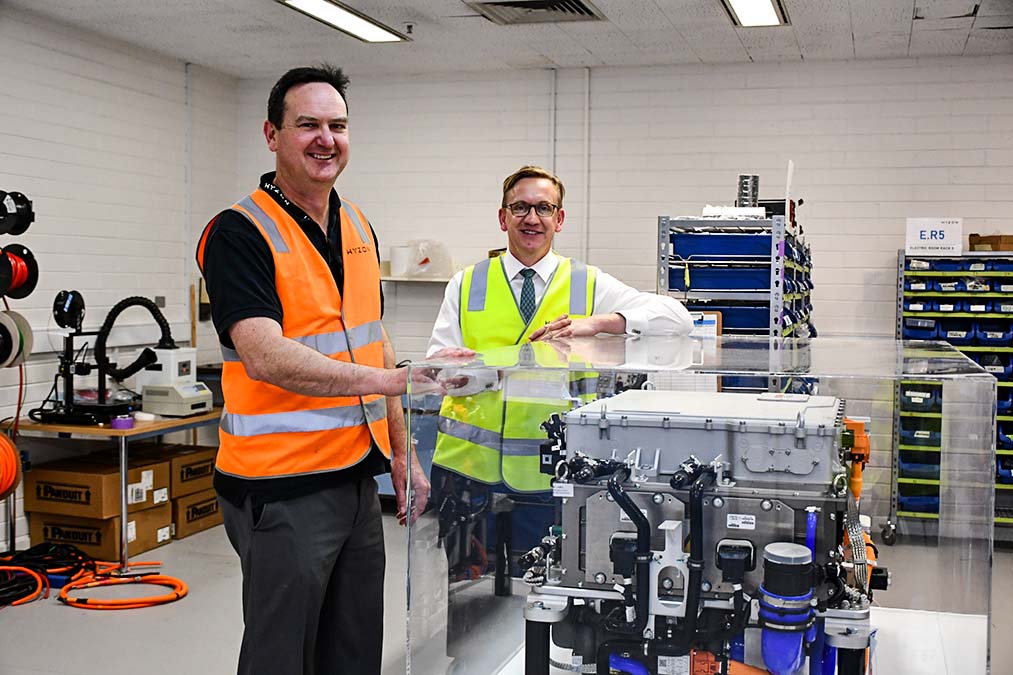
We can make more things here. We should make more things here and we must make more things here.
Australia must make more things here
House of Representatives - 8 March, 2023
We were just treated to another in the series of bizarre contributions from those opposite. Using a reasonable voice can't cover up the abject nonsense which is being spouted by those opposite. They're talking down Australian manufacturing saying, 'It is terrible. It's stuffed. There are no workers. Energy prices are out of control.' We even heard, from the previous speaker, that manufacturing in Australia is now 'on an extinction pathway.'
It's like they forget they were the government for the last nine years. It hasn't all changed overnight. The people opposite were the government of the country, through the last decade of dysfunction, dithering, delay and decay. They're responsible for the situation we're in. I'll just remind the speakers still to come: maybe try taking some responsibility and have a look at your own record as you talk about the situation the country's in.
We had eight industry ministers—actually, we had nine. We only had eight that the Australian people knew about and the ninth, of course, was Scott Morrison, who was the secret industry minister when he was also Prime Minister. So that's nine industry ministers in nine years. Apparently, it's Labor's fault that they made such a mess. There's a joke in my community: 'How do you know there's an election on? The Liberals turn up at a mosque.' It's a little bit like what we're hearing here. How do you know the election's over? The Liberals start to care and talk about Australian manufacturing. It is pathetic.

If COVID taught our country anything, it's about disruption to supply chains. If Russia's illegal war in Ukraine taught us anything, it's about the need to manufacture the consumables of war and conflict. If history and common sense teach our nation anything, then it is the critical importance of urgently boosting our sovereign manufacturing capability. The government says, as we're mocked, 'We need to make more things here.' We can make more things here. We should make more things here and we must make more things here.
As the Prime Minister has been saying, before the election and since, we need 'a future made in Australia.' That's what our suite of policies, together, are about. And the National Reconstruction Fund, the $15 billion fund, which is the subject of the National Reconstruction Fund Corporation Bill, is a critical part of that. We have a mandate. We announced it, we released it before the election, and it was carefully designed with industry to respond to actual issues out there in the economy. And yet, those opposite say they're going to vote against it. I encourage them to reconsider their position. To the Greens political party: don't join with the Liberals. Back Australian manufacturing; it's now urgent.
It's got two big goals: to transform industry—bringing new technology and critical sectors—and to create more secure, well-paid jobs, which are so important in my community in south-east Melbourne, covering part of the great south-east metropolitan manufacturing precinct stretching through Dandenong and Hallam. It's the largest single employment sector in that region. It really frustrates me when we hear the common media narrative talking down Australian manufacturing. That said, there are a few home truths. We'll never make everything here. We're a country of 25 million people in a globally connected interdependent world of complex supply chains; we can't make everything here.
Of course we have to work with the rest of the world but we need to do much better. If you look at the stats, we are now around the lowest for manufacturing self-sufficiency of any developed country in the world. It is the record we have inherited from the former government that they do not want to own, don't want to talk about. They want to use a reasonable voice so people forget that they were the government responsible for this. That is what we hear. It is all doom and gloom. We heard the former Speaker say, 'My businesses yell at me, 'We are on a path to extinction.' Well, I tell you what you can do if energy prices are such a big deal. You could have voted for the government's energy price relief plan. We recalled parliament in December to cap gas prices to give immediate relief to manufacturers, and what did those opposite do? They voted against it. And what did they do before the election? They changed the law to cover up—I would say 'lie', but we are in the parliament, so I can't say 'lie'—the power price rises that were coming down the pipeline which consumers and businesses are now suffering from. But instead of working with the government to clean up the mess, they voted against it. They voted against power price relief, just as they say they are going to vote against support for manufacturing.
We are also too low in economic complexity, which is a nerdy measure that economists use to look at how complex our economy is. Can we make a wide diversity of goods, particularly high-value complex goods? Japan is at the top of that list. A few years ago we slipped to 87th out of the 133 countries measured and it went down over the decade this mob were in office compared to the previous decade. It is now urgent that this bill passes after a decade of neglect and drift. Those opposite chased the car industry out of Australia. Right here in the parliament, from the government benches, Joe Hockey and Tony Abbott were daring them to leave and guess what?—they left.
Those opposite played politics with grants. The former prime minister made himself the chief decider in the modern manufacturing grants. He was going to make all the decisions. At least that was honest. It was not the series of coloured spreadsheets and dodgy stuff that the Auditor-General found in all the other grants programs. At least he owned it—well done. We have an inquiry into that, and some public hearings on Friday. We will see what went on. As I said, there were eight industry ministers. We will name the rogues' gallery: McFarlane, Pyne, Hunt, Sinodinos, Cash, Andrews—she's still here—Porter, Taylor and Morrison—he is sort of sometimes here. But despite their wasted decade, the $1 trillion in Liberal debt, all the mess, they have learnt to nothing. They are still here in their reasonable voice talking down Australian manufacturing instead of working with the government in the national interest. In voting for the bill to urgently revitalise manufacturing, they say 'no, no, no'. I think we are not allowed to call them the no-alition in here at the moment. It is one of those grey areas. We will stay away from that but we do it outside, though.
DEPUTY SPEAKER ( Dr Freelander ): I think that is right.
Mr Hill: Yes, okay, I've got that. I am going to quote myself. Mayor Quimby from The Simpsons used to quote himself, so I will be that guy for a moment. In my first speech to this parliament, I talked about the future of Australian manufacturing and said: 'If we are going to succeed, the story of manufacturing has to be like, will be like, the story of agriculture over 100 years. We will see greater investment in technology, more mechanisation.' We want to climb the value chain, value-add to our natural resources, the raw products. It will mean higher skilled jobs, higher wage jobs but fewer jobs overall, more productivity. That is the future we want to chase—high wage, secure, good, well-paid, skilled jobs.
We can't compete with the low-wage countries. That is not where we want to go. We want to climb that value chain across the globe. That is future success and that is exactly what this bill is about. It will provide finance, including loans, guarantees and equity to drive investments in seven priority areas in Australian manufacturing.
It will be loans, guarantees and equity, not grants, modelled on the very successful Clean Energy Finance Corporation, an initiative of the former Rudd-Gillard government. Oh, it was Tony Abbott's mob actually, wasn't it, who tried to get rid of the Clean Energy Finance Corporation? Thank goodness they could not get through the Senate because it is still there today and it has made record investments into clean energy, stimulated new investments in new technology and has gone some way—one of the few things that was working under that mob—to lowering our emissions.
The seven priority areas include: value adding to resources; value adding in the agriculture, forestry and fisheries sectors; unlocking potential and value-adding to raw materials like food processing, textiles, clothing, food manufacturing; developing capabilities in transport manufacturing and supply chains—cars, trains, shipbuilding are all important in so many other states and territories; medical science—leveraging our world-leading research.
You know about this, Deputy Speaker Freelander, from your life as a renowned medical specialist, teacher and researcher. It is about providing essential supplies such as medical devices, PPE, medicines and vaccines. We can say 'PPE' post the pandemic, and people know what it is because we learned as a country that we need to make that stuff here and not rely on other countries when a crisis happens. We're too vulnerable to supply shocks. We're too vulnerable, frankly, to military blockades should the worst happen, because we don't make enough basic stuff here. It's urgent.
On renewables and low-emission technologies, we almost got an admission from the former speaker in his reasonable voice. He almost admitted that renewable energy might be the cheapest form of new power. We will take that as a baby step forward from the nuclear brigade over there. We might get two steps backwards today as they go on their nuclear tour of world disaster sites with Uncle Ted over there and his home-made videos.
Defence capability is so important—a lesson from Ukraine. You've got to make the consumables of war. You've got to be able, at the very least, to maintain, repair and sustain the platforms and capabilities that you do have—you can't make all the big, new, shiny stuff here—and all the enabling capabilities such as engineering, data science, software development, artificial intelligence, robotics and quantum.
So get with the program. I say to the opposition: have a serious look at the challenges we face and back this. Maybe they object to the fact that it's not a slush fund. Whenever they hear 'fund', their little eyes light up from their time in government. 'Oh, how can we rort this? How can we distribute this to all the Liberal marginal seats? We did a good job with the congestion fund, didn't we?'
Apparently, congestion only happens in Liberal electorates. That's why you put 83 per cent of the congestion fund into Liberal-held electorates. Maybe that's the issue: they're worried that Labor will fairly distribute this. Well, they're not going to be decisions made by politicians. They will be made by an independent board. You could learn from that.
In closing, I say to the opposition and the Greens: get with the program. Back Australian manufacturing. I say in particular to the Greens political party: don't vote with the Liberals all the time. Don't team up with the Liberals. Back Australian manufacturing and support this bill.